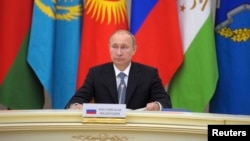SOCHI, RUSSIA —
Russian President Vladimir Putin warned ex-Soviet allies on Monday that Islamist militancy fueling the war in Syria could reach their countries, some of which have Muslim majorities.
Russia, which has a large Muslim minority of its own and is fighting an Islamist insurgency, has accused the West of helping militants by seeking Syrian President Bashar al-Assad's removal without paying enough attention to the potential consequences.
Putin told leaders of the six-nation Collective Security Treaty Organization [CSTO] that militants fighting Assad eventually could expand attacks beyond Syria and the Middle East.
“The militant groups [in Syria] did not come out of nowhere, and they will not vanish into thin air,” said Putin.
“The problem of terrorism spilling from one country to another is absolutely real and could directly affect the interests of any one of our countries,” he said, citing the deadly attack on a shopping mall in Nairobi as an example.
“We are now witnessing a terrible tragedy unfold in Kenya. The militants came from another country, as far as we can judge, and are committing horrendous bloody crimes,” Putin said at a CSTO summit in the Russian Black Sea resort city of Sochi.
His words appeared to be a warning about violence spreading from both Syria and Afghanistan, which shares a long border with CSTO member Tajikistan in Central Asia. The security alliance also includes Kazakhstan, Kyrgyzstan, Armenia and Belarus.
Tajikistan, Kazakhstan and Kyrgyzstan all have mostly Muslim populations.
Russian officials have expressed concern that Russian-born militants fighting in Syria could return to Russia's North Caucasus and join an insurgency that claims lives almost daily.
They also have voiced worries that violence could spread into former Soviet Central Asia and Russia after the withdrawal of most Western troops from Afghanistan by the end of next year.
Russia has been one of Syria's strongest backers in a conflict that has killed more than 100,000 people since it began in March 2011, delivering arms to Assad's forces and joining China in blocking Western-backed initiatives in the U.N. Security Council.
Russia, which has echoed Assad's contention that he is fighting al-Qaida-inspired Islamists rather than a popular revolt against his autocratic rule, has warned the West that military intervention in Syria would play into the hands of the militants.
Russia, which has a large Muslim minority of its own and is fighting an Islamist insurgency, has accused the West of helping militants by seeking Syrian President Bashar al-Assad's removal without paying enough attention to the potential consequences.
Putin told leaders of the six-nation Collective Security Treaty Organization [CSTO] that militants fighting Assad eventually could expand attacks beyond Syria and the Middle East.
“The militant groups [in Syria] did not come out of nowhere, and they will not vanish into thin air,” said Putin.
“The problem of terrorism spilling from one country to another is absolutely real and could directly affect the interests of any one of our countries,” he said, citing the deadly attack on a shopping mall in Nairobi as an example.
“We are now witnessing a terrible tragedy unfold in Kenya. The militants came from another country, as far as we can judge, and are committing horrendous bloody crimes,” Putin said at a CSTO summit in the Russian Black Sea resort city of Sochi.
His words appeared to be a warning about violence spreading from both Syria and Afghanistan, which shares a long border with CSTO member Tajikistan in Central Asia. The security alliance also includes Kazakhstan, Kyrgyzstan, Armenia and Belarus.
Tajikistan, Kazakhstan and Kyrgyzstan all have mostly Muslim populations.
Russian officials have expressed concern that Russian-born militants fighting in Syria could return to Russia's North Caucasus and join an insurgency that claims lives almost daily.
They also have voiced worries that violence could spread into former Soviet Central Asia and Russia after the withdrawal of most Western troops from Afghanistan by the end of next year.
Russia has been one of Syria's strongest backers in a conflict that has killed more than 100,000 people since it began in March 2011, delivering arms to Assad's forces and joining China in blocking Western-backed initiatives in the U.N. Security Council.
Russia, which has echoed Assad's contention that he is fighting al-Qaida-inspired Islamists rather than a popular revolt against his autocratic rule, has warned the West that military intervention in Syria would play into the hands of the militants.
